I know you are ready for 2021 marketing trends because you read this blog and tons of other marketing blogs, right?
Here is the thing: I also read the most popular marketing blogs, follow all of the marketing YouTube channels, and listen to the same podcasts you do.
And I’ve noticed very few people are talking about what’s really going to happen in 2021 and beyond.
Sure, they talk about the importance of voice search and Google going mobile-first. They might mention marketing automation. There are actually more interesting trends that will affect your marketing that no one is really talking about.
What marketing trends should you actually be focusing on?
Marketing Trend #1: Companies that Rely on Google Analytics Will Lose
We all love Google Analytics.
Heck, I love it so much I log in at least three or four times a day. And here is the kicker: I get so much traffic that my Google Analytics only updates once a day.
You are probably wondering, what’s wrong with Google Analytics?
There actually isn’t much wrong with it. It’s a great tool, especially considering that it’s free.
However, marketing is changing. New channels are being constantly introduced, such as voice search.
Transactions no longer are as simple as someone coming to your site from an ad and buying.
These days there are things like upsells, down sells, repeat purchases, retargeting, and even checkout bumps. On top of that, there are so many different ways you can generate revenue for your online business, such as partnerships, affiliate marketing, and even webinars.
This has caused companies to use analytics solutions that better tie into their database, such as Amplitude. Or better yet, you will see a big push into business intelligence.
A central place where you can tie in all of your data and make better-informed decisions so you can optimize for your lifetime value instead of your short-term income.
In 2021, you'll see more companies adopting business intelligence solutions, from paid ones to free ones like Google Data Studio.
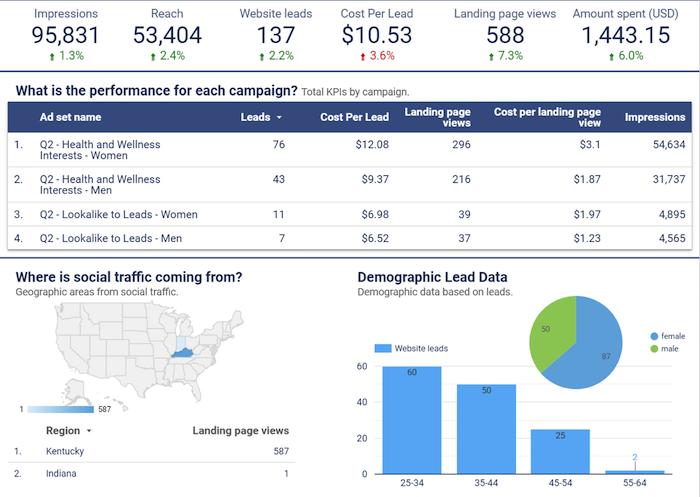
If you haven’t checked out Data Studio, you’ll want to start now because it is easy to pass in all of your business and marketing data into one place.
For example, you can pass in more granular data from your Facebook ad campaigns into Data Studio, which would be difficult to do with Google Analytics.
Another tool that will give you an edge is Ubersuggest (and its free Chrome extension), as it helps you outperform your competitors in the search engines.
For example, Google Analytics no longer provides comprehensive data regarding the keywords sending traffic to your website. While you can make assumptions based on top keywords, you'll never really know for sure.
That leaves the door open for your competitors.
With Ubersuggest, it only takes a few minutes to dig up keyword data so you can adjust your content and marketing strategies accordingly.
Step #1: Enter Your URL and Click “Search”
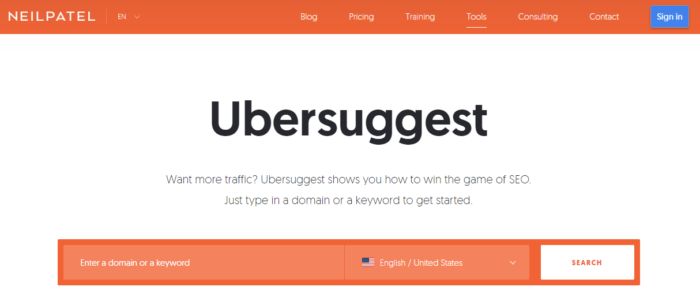
We're using Close, a leading inside sales CRM with a strong search engine presence for this example.
Step #2: Review the Domain Overview
Most importantly, you'll find the number of organic keywords your domain ranks for. Other data includes:
- Organic monthly traffic: The total estimated traffic the domain gets for the keywords.
- Domain score: The overall strength of the website, with 1 the lowest and 100 the highest
- Backlinks: The number of backlinks to the website from other websites
Step #3: Scroll Down to SEO Keywords
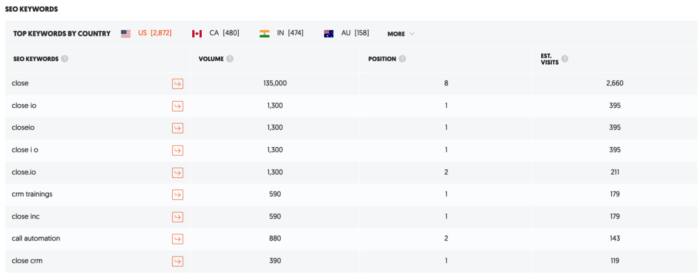
This is the data you won't find on Google Analytics.
The lefthand column is a list of all the keywords your site ranks for. In this case, there are 6,135 of them. This is followed by:
- Volume: The number of searches the keyword gets each month
- Position: The position the URL is ranked for in Google search
- Estimated visits: The estimated traffic the web page gets from Google for the keyword.
Not only does Analytics withhold information on keywords, but there's nothing about volume, position, and estimated visits.
You have to use other tools, such as Keyword Planner, to find this. Ubersuggest brings it all under one roof.
Step #4: Review All Your Keywords
In addition to reviewing all your keywords, complete with volume, position, estimated visits, and SEO difficulty, you can also type in a competitor's name and see their keywords.
This gives you new ideas of terms to go after. Sticking with the above example, you could run a search for Pipedrive. Here's what you get:
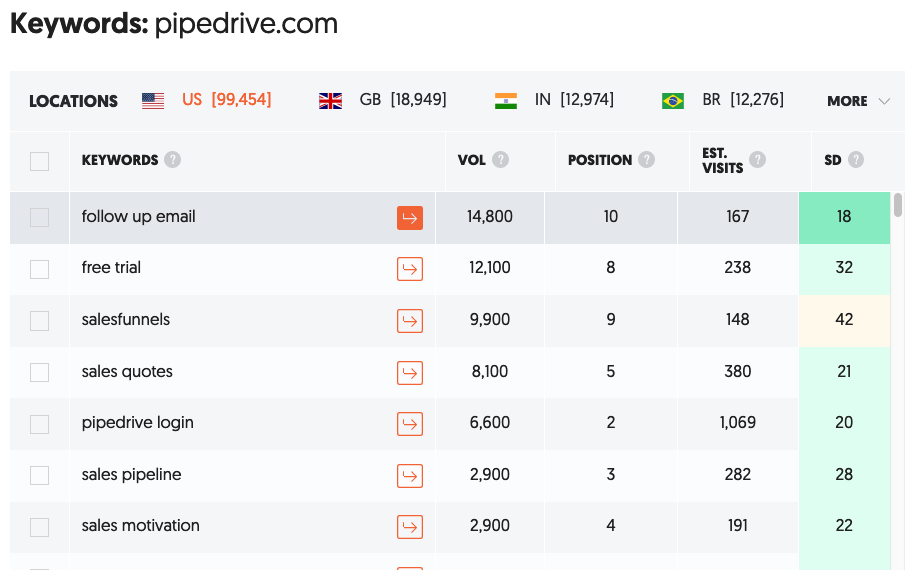
Now, in addition to the keywords you're already ranking for, you can uncover those that your competitors are ranking for, thus giving you additional ideas on what to target next.
I've used Google Analytics since day one, and that'll never change. However, it's not capable of doing everything you need to beat your competition.
If you want to win big, combine Analytics with other tools, such as Ubersuggest, to access advanced data for making more informed decisions.
Marketing Trend #2: Companies Will Optimize for Voice Search, But Not for Revenue
According to ComScore, over 50 percent of searches are from voice search; but that’s not really a new trend — everyone has been talking about voice search for years.
What’s the big deal?
Optimizing for voice search is a great way to get your brand out more, but how will it convert into sales?
I haven’t seen too many solutions for capitalizing on your voice search traffic, but so far, there is Jetson.ai.
If you aren’t familiar with Jetson.ai, it makes it so people can buy from your site using voice search. It doesn’t matter if it is Alexa or Google Home; they work with the most popular devices.
What’s cool about Jetson.ai is that it can learn from each customer and customize the interactions.
For example, if I keep ordering the same toothpaste from a specific store using voice search, Jetson.ai keeps track of that so you can easily keep ordering the same product over and over again with little to no friction.
Heck, it’s easier than logging into your computer or pulling out your phone to make a purchase.
Marketing Trend #3: Your Email List Won’t Convert As Well; Look for Alternative Communication Channels
Email; it’s something we all use in the marketing world.
Here's the interesting thing — I’m in a group with a bit over 109 email marketers across different industries in different parts of the world.
Can you guess what we are all noticing?
Our open rates are staying roughly the same, and that’s largely because we all know how to clean and optimizing for deliverability.
However, our click rates are going down.
So far, we have seen our click rates drop by 9.4 percent.
That’s crazy, considering as a group, we have over 146 million email addresses.
Does this mean email is dead?
Of course not!
Email is here to stay and will be here for a very long time.
However, companies will have to leverage more communication channels.
Chatbots are taking off. Not necessarily the Intercom’s or Drift’s of the world but more so the solutions like ManyChat and MobileMonkey.
In addition to chatbots, more people are leveraging tools that allow push notifications like Subscribers.
It’s so powerful; here is the impact I’ve been able to generate from push notifications so far using Subscribers.
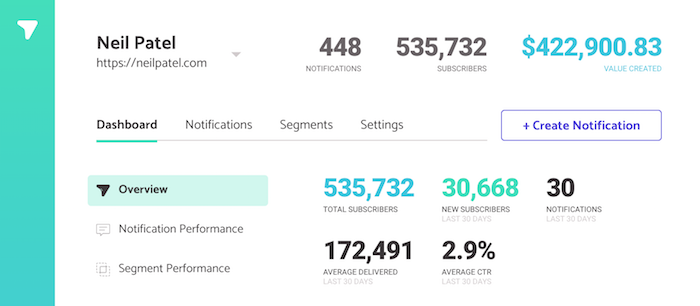
You can wait till next year to leverage chatbots for lead generation and customer service, but I’d recommend you start sooner rather than later.
Marketing Trend #4: Moats Will Be Non-Existent, Other than Brands
You’ve probably heard the word “moat” before. If you haven’t, just think about water around a castle.
There's water all around the castle, and a drawbridge is used to get in and out of the castle, protecting them from invaders.
With your business, you may have a moat.
It could be a feature, cost structure, technological advantage, or even a marketing advantage.
Over the years, moats in the online world have slowly disappeared.
It’s easy for anyone to copy marketing strategies these days. What’s separating you from your competition?
Something that works right now might not work next year.
Do you know what will still be a strong moat in 2021 and even a stronger one in the future?
It’s branding.
People buy Jordan shoes because they love Michael Jordan. His brand is stronger than ever, even though he hasn’t played in the NBA for over a decade.
His shoes are so popular, it’s helped him boost his net worth to over a billion dollars. Plus owning a basketball team doesn’t hurt either.
What’s interesting is he made more money after retirement than he did as a basketball player.
It’s not just Jordan who built a strong brand — so have the Kardashians.
According to Forbes, Kylie launched a billion-dollar company, and it was all because of her personal brand. Her cosmetic company isn’t doing anything revolutionary. She just has a strong brand.
The same goes for companies like Ferrari, Tesla, American Express — and the list goes on and on.
It’s why companies are spending over 10 billion dollars a year on influencer marketing.
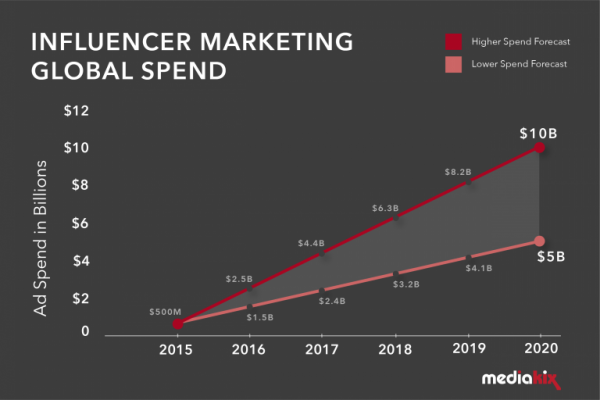
Just look at my agency NP Digital. It’s literally one of the fastest-growing ad agencies out there. When I look at all of my competitors’ numbers, we are growing at a much faster pace because of my brand.
Yes, we have a great team, but again, that really isn’t a moat as many agencies have great teams.
It’s my brand that gave us a swift kick start and continues to hopefully push us up.
You’ll want to focus on brand building in 2021. Whether it is personal or corporate, it’s the best moat you can build in marketing. Plus, it will help you with Google’s EAT.
Marketing Trend #5: You Have No Choice But to Use Automation
When I first started off as an entrepreneur, I turned to SEO because I couldn’t afford the big ad budgets like my competitors.
Heck, I couldn’t even afford to run any paid ads.
Over the years, the playing field has become more level.
Credit card companies like Brex make it easier for startups to get approved for larger limits and you may not have to pay them back right away.
Financing companies will give you cash to spend on marketing, so non-venture-funded companies can more easily compete.
Companies like Lighter Capital offer loans based on your existing revenue.
And to top it off, software solutions are now starting to integrate AI to give better recommendations. From Clickflow and RankScience to Distilled ODN, everyone using AI to make SEO and other forms of marketing easier.
Heck, BrightEdge can even automate your SEO (or at least a large portion of it). Their automated SEO solution increases page views per visit by 60 percent and provides 21 percent more keywords on page one.
Keep in mind their clients are huge (their software starts in the thousands of dollars per month) so they would probably see better results than most companies, but still, you will see many more software companies leveraging AI in SEO.
This is being driven by the rise of AI, Rank Brain, and natural language processing.
Even with Ubersuggest, I’m working on AI that does the SEO for you, so you no longer have to spend endless hours on SEO while saving you thousands of dollars.
In other words, the marketing playing field is getting more even. If you want to do well, you will have to leverage AI and marketing automation to survive.
If everyone is leveraging the same AI marketing technology, how can you beat your competitors?
Well, it will come down to everything else — price, customer service, upselling, operations, sales. All of that small stuff is what’s going to help you win.
This brings me to my next point.
Marketing Trend #6: There Are No More Silver Bullets, We All Have to Optimize for Marginal Gains
A lot of businesses were built using just one marketing channel.
Dropbox grew through referral marketing. Invite more friends, get more free space.
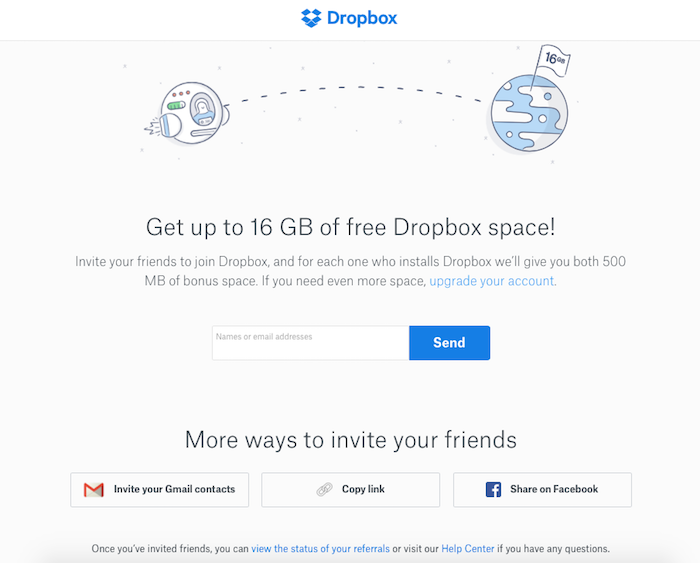
Facebook was built off your email address book. Facebook used to tap into it and invite all of your contacts to use Facebook on your behalf.
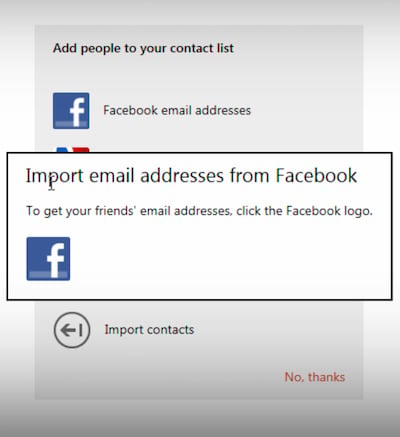
Companies like Quora and Yelp were built off of SEO. All of those rankings really help drive their businesses.
But you no longer can build a business through just one marketing channel. Good channels get saturated extremely fast. (Take a look at Facebook organic reach if you need a reminder…)
Even if they work and cause explosive growth, it will only last for a short while before your competitors jump on board and make it harder.
Marketing will soon be all about “marginal gains.”
There’s a British cycling coach named Dave Brailsford. His belief was that if you improved every area related to cycling by just one percent, then those small gains would add up to remarkable improvement.
He’s right, that’s how you win a race.
The same will be true with your marketing.
There will be a big shift from people focusing on one channel and trying to find the “Holy Grail of marketing” to working on slightly improving each area of your marketing.
From split testing your title tags to get a few ranking improvements to adding checkout bumps to your order page so you can spend a little bit more on your paid ads to using Google Data Studio to better optimize for your lifetime value—it's all about the little things.
That’s what is going to add up to winning.
That’s what you’ll have to shift your mindset to in order to win in 2021 and beyond.
Marketing Trend #7: Depersonalization is the New Marketing
The problem with marketing as it exists today is that 95 percent of your visitors will never convert into a customer. That’s if you are lucky.
Chances are you are more likely looking at 97 percent or more of site visitors leaving without converting.
The big reason isn’t that your marketing sucks or that all of those visitors are junk and unqualified.
It’s that your message doesn’t fit every single one of your visitors.
Personalization allows you to convert more of your visitors into customers.
A basic example of this is Amazon.
When you go to Amazon, they know what you typically buy, so they show you what they think you'll want to boost their conversions.
It works! When I log into Amazon, I see tons of household supplies because that's what I buy the most often. I never buy dog food (which is smart because I don’t have a dog,) so I'll never see ads for dog food.
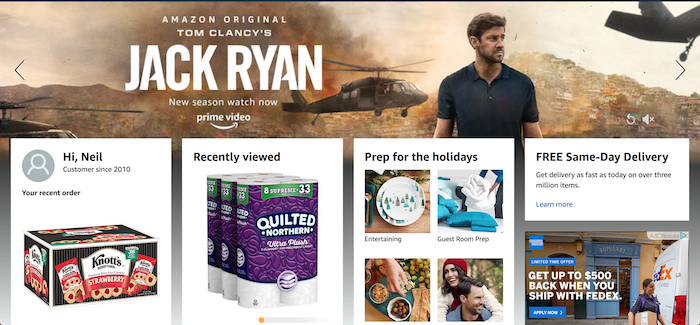
Businesses are also trying to personalize each and every single experience, both online and offline.
Companies like Amperity are trying to create a customer relationship engine so you can better serve each of your customers, whether it is online or offline.
Marketing has become a game of personalization. With ad costs and general marketing costs rising, you have no choice but to figure out how to convert the 97 percent of your traffic that just never comes back.
The problem is, everyone else is using the same exact personalization strategies, and consumers are getting wise.
This is why depersonalization is going to be big.
Rather than using names in an email, brands need to dial back the fake personalization efforts and focus on transparency and writing like a real, live person.
2021 Marketing Trends FAQ
The top strategies to pay attention to are automation, depersonalization, and alternative communication channels. The way we use the internet is changing–so is the way we market.
There are no longer any silver bullets. In today's world, organizations must optimize for small changes that add up over time.
Content remains one of the most effective forms of marketing. Creating high-quality content that informs and educates is crucial. Consider adding automation to help you do more in less time.
AI and machine learning are impacting marketing in a big way. Google's move away from third-party cookies is also impacting paid ads.
2021 Marketing Trends Conclusion
These are the marketing trends that will come true, and you need to be prepared for them.
Here’s the beautiful part, though. Now you have a chance to act on the information before your competition. Make sure you get in ahead of the crowd.
I want to see you not only succeed, but I want you to beat your competition. Whether you are a big company or just starting off with very little to no money, I believe you can.
What do you think of the trends above? Do you see any marketing trends that few people are talking about?
————————————————————————————————————————————–
By: Neil Patel
Title: 2021 Marketing Trends: Here’s What Nobody is Talking About
Sourced From: neilpatel.com/blog/marketing-trends/
Published Date: Mon, 12 Jul 2021 13:00:00 +0000